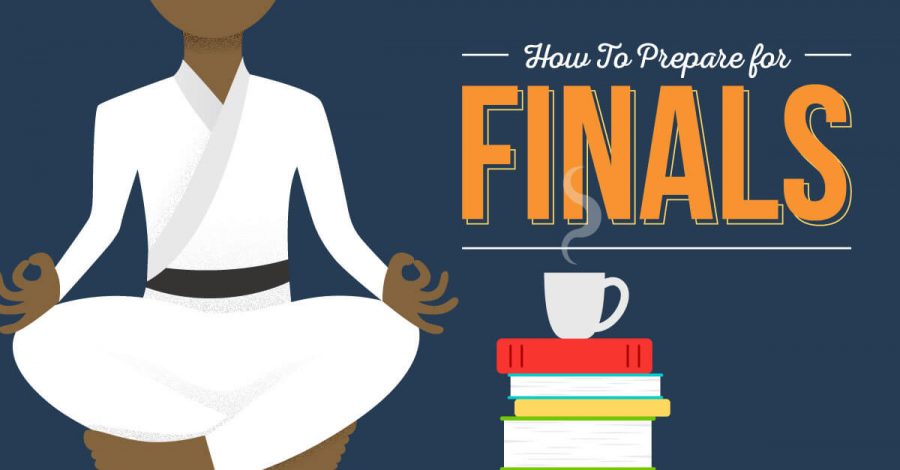Five study tips for finals
December 12, 2019
 The week before final exams can definitely be a frustrating and exhausting experience if one is not properly prepared. Most students rely on caffeine rushes and all-nighters to get through exams, but the benefits of understanding how to prepare for finals far outweigh the burdens of staying up all night to cram. Here are a few tips to prepare for the upcoming finals:
The week before final exams can definitely be a frustrating and exhausting experience if one is not properly prepared. Most students rely on caffeine rushes and all-nighters to get through exams, but the benefits of understanding how to prepare for finals far outweigh the burdens of staying up all night to cram. Here are a few tips to prepare for the upcoming finals:
 1. Find a good study spot. Does the room have enough light? Is the seat comfortable? Is there enough space for all the notes? Is the cellphone out of sight? It is important to prepare an efficient area to get the most out of studying. Make sure to remove all distractions in order to be able to focus as much as possible. Keep in mind everyone prefers a different environment– this may mean complete silence for one, but for others, background music helps. In fact, according to Study.com, listening to music can assist students with beating stress and boosting endurance in a long study session. In some cases, students have found that plugging in their earphones helps with memorization, likely by developing a positive mood, which indirectly stimulates memory formation.
1. Find a good study spot. Does the room have enough light? Is the seat comfortable? Is there enough space for all the notes? Is the cellphone out of sight? It is important to prepare an efficient area to get the most out of studying. Make sure to remove all distractions in order to be able to focus as much as possible. Keep in mind everyone prefers a different environment– this may mean complete silence for one, but for others, background music helps. In fact, according to Study.com, listening to music can assist students with beating stress and boosting endurance in a long study session. In some cases, students have found that plugging in their earphones helps with memorization, likely by developing a positive mood, which indirectly stimulates memory formation.
2. Practice with an old exam. As TopUniversities.com mentions, one of the most practical ways to prepare for upcoming tests is to take past versions. No matter what type of exam it is, this enables one to become familiarized with the format of the questions. Not only that, if one sets up a timer, it can also serve as good practice for making sure they spend an adequate amount of time on each section.
 3. Get together with friends. Not to socialize, but to study of course! As some say, multiple brains are better than one. Someone may have questions that another will have the answers to and vice versa. In reality, StudySoup.com says having a few friends alongside comes with benefits. Those who work in groups are more likely to have the capacity to think critically about the topic they are working on and achieve an outstanding levelof learning. As long as everyone stays concentrated on the material for an agreed amount of time, this can be one of the most productive ways to challenge oneself.
3. Get together with friends. Not to socialize, but to study of course! As some say, multiple brains are better than one. Someone may have questions that another will have the answers to and vice versa. In reality, StudySoup.com says having a few friends alongside comes with benefits. Those who work in groups are more likely to have the capacity to think critically about the topic they are working on and achieve an outstanding levelof learning. As long as everyone stays concentrated on the material for an agreed amount of time, this can be one of the most productive ways to challenge oneself.
4. Take breaks regularly. While one may think it is best to pile on notes for as many hours as possible, this can actually be counterproductive. Research has shown that for long-term retention of knowledge, taking occasional breaks helps. Being outside and getting a kick out of the sunshine is vital for a healthy brain. During breaks, remember to also fuel up on nutritious snacks. What one consumes can have a tremendous impact on energy levels and the ability to focus. Keep the brain and body stimulated by reaching for foods that have been proven to promote concentration, such as nuts, yogurt and blueberries. Sugar may seem the most appealing in times like these, but the energy level will most likely crash an hour later.

5. Time management. The last and probably most valuable tip is to manage the time efficiently. Do not leave the studying until the last minute. This may seem like an obvious tip, but many students are prone to pushing off their tasks until the very last day. While some people do seem to thrive on last-minute cramming, it is certainly not the best strategy to approach the final exam. To help sort with time, one can set up an agenda for their study. This way, they can jot down how many exams they have and which days they occur on. Likewise, it is essential to organize the study accordingly. Consider giving some exams more study time than others if the content is more challenging.
Remember that different methods will work best for different students. As finals approach, try out various strategies and see what will be the most favorable for you.































